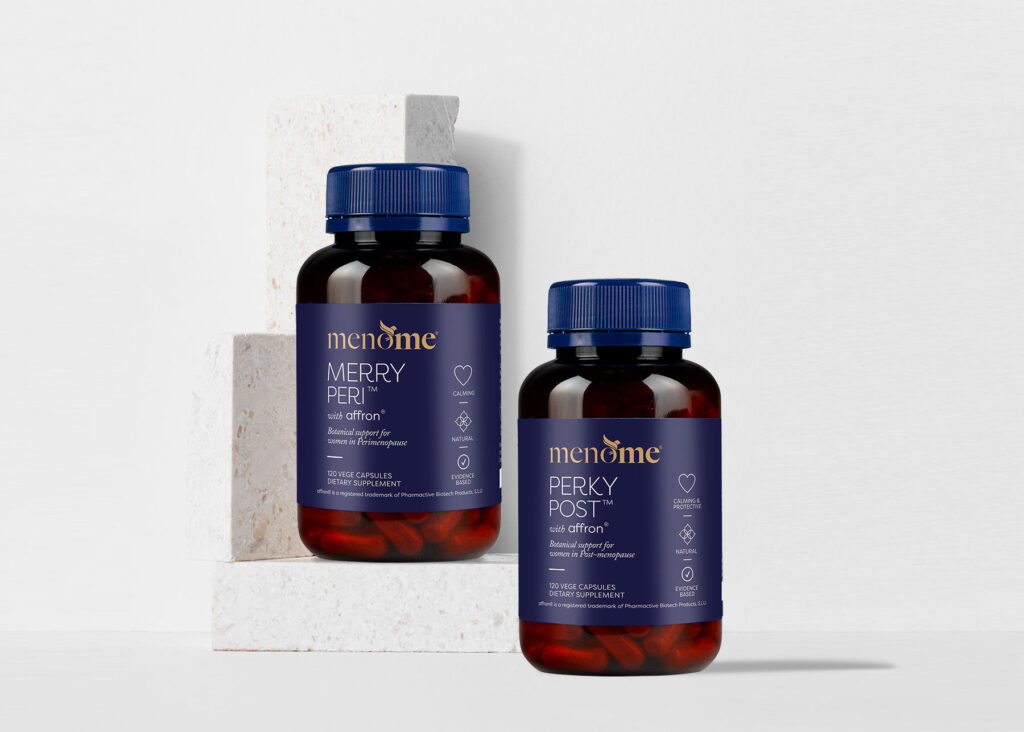Unfortunately, depression and anxiety are two of the more common signs of perimenopause and menopause.
Not to be Debbie Downers, of course. At Meno-Me®, we believe in the power of vitamin H (humour) to get us through the tough stuff – but we also know that depression and anxiety during menopause are very real. We’ve lived it.
That said, mood issues shouldn’t be considered just “part of the package.” If they show up, it’s crucial to take them seriously and seek support.
Why Mental Health During Menopause Is Often Missed
According to Professor Jayashri Kulkarni AM, founder and director HER Centre Australia, 30-50% of women experience anxiety or depression during this time of life.
Yet despite the statistics, menopause-related mental health symptoms often fly under the radar. Hot flushes, night sweats and weight gain tend to steal the spotlight.
Sure, there are memes aplenty (and we’re the first to chuckle at a good one), but the serious side of menopause has gone under-recognised for too long.
In fact, it wasn’t until 2018 that the first clinical guidelines for perimenopausal depression were even published.
Some experts argue that menopause-related depression is a distinct subtype of depression, different from the classic clinical presentation and deserving of its own category. Because a perimenopausal woman’s risk of depression is high1.
Did you know?
Hormones have a powerful impact on our brains and bodies. So it’s no surprise that a woman’s risk of depression spikes at times of hormonal change – puberty, postpartum and perimenopause,
Here’s what might surprise you:
Women are twice as likely to be vulnerable to depression as men.
During perimenopause, that risk may triple or even quadruple, according to Harvard research.
If you’ve had anxiety or depression in the past, your chances of experiencing a recurrence during menopause go up.
Yikes. But – and this is important – not all women will experience anxiety or depression during this transition. So if you’re not feeling it, great! But if you are, you’re far from alone.
How Do You Know If You Have Depression or Anxiety?
Depression
Depression is more debilitating than a touch of the ‘blues’. It’s normal to feel ‘blah’ or unhappy at times and it should pass.
In comparison, depression can cause loss of interest in life, things you’ve always enjoyed and those you love. Winston Churchill nicknamed depression The Black Dog because the experience is akin to finding yourself in a dark hole.
Untreated clinical depression is also linked to thoughts of suicide, which becomes a danger for those experiencing it.
And for women aged 45-54, the suicide statistics are not only deeply disturbing, they’re also increasing.2
What Is Clinical Depression?
While “depression” is often used as a catch-all term, clinical depression is a diagnosable medical condition. No amount of “snapping out of it” will fix it3.
It’s defined by a noticeable change in normal functioning lasting two weeks or more, and symptoms may include:
Changes in appetite
Loss of pleasure or interest
Oversleeping or insomnia
Low energy
Feelings of worthlessness or hopelessness

Anxiety
Now let’s talk about anxiety – which, frustratingly, also loves to show up during menopause.
It’s that racing-heart, can’t-sit-still, send-of-doom feeling.
Anxiety during menopause can come with:
Persistent worry or dread
Restlessness or irritability
Tight chest, rapid heartbeat
Panic attacks (in some cases)
Interestingly, women who’ve never struggled with anxiety before may find it sneaking in during perimenopause and beyond.⁴
What Causes Depression And Anxiety At Menopause?

You guessed it: hormones (though not just hormones).
As progesterone and estrogen levels decline – sometimes as early as your mid-30s- mood changes often follow.
Progesterone is known for its calming effect. When it dips, you may feel more irritable or emotionally fragile.
Estrogen plays a big role in regulating brain chemicals like serotonin. When it fluctuates, some women find themselves fixating on negative thoughts or feeling overwhelmed by minor stress.
So if your moods feel a little…unpredictable? It’s not your imagination.
- You’re not weak.
- You’re not going mad.
- And you absolutely don’t need to suffer in silence.
Related: Why does our brain change at menopause?
Could Your Low Mood Be Something Else?
Yes – and often, it’s a bit of everything.
Hormones may open the door, but life often barrels right through.
Midlife can bring some heavy hitters:
Ageing parents
Career changes or pressures
Divorce or relationship tension
Financial stress
Fertility grief (even if motherhood wasn’t your plan)
Empty nest syndrome
- Low energy
- Paranoid thinking
- Irritability or hostility
- Decreased self-esteem
- Isolation
- Anxiety
- Somatic symptoms (extreme anxiety about physical symptoms such as pain)
- Sleep disturbance
- Weight gain
- Decreased sexual interest
- Problems with memory and concentration
- Thoughts of suicide
Source: Australian Prescriber2
16 Possible Triggers for Menopausal Mood Changes
An Australian study uncovered common factors linked to increased risk of depression during menopause5
- Negative mood before menopause
- Pessimistic attitude toward menopause and ageing
- Smoking
- Little or no exercise
- No partner
- Poor self-perceived health
- Adverse feelings toward partner
- A number of perceived problems
- Interpersonal stress
- The onset of illness in self or others
- Care of ageing parents
- Changes in employment
- Change in the childbearing role
- Loss of fertility, which may be associated with a loss of the essential meaning of life
- Empty nest syndrome
- The societal value of youth (in societies where age is valued, women tend to report having fewer symptoms at the menopause transition)
Source: Postmenopausal Syndrome Indian J Psychiatry
8 Things You Can Do If You Have Anxiety or Depression
While it’s vital to seek support from health professionals, there are several lifestyle shifts that can positively impact your mood and mental wellbeing.
Think of it as building your own personal toolbox – one that helps you feel more like you again.
Here’s where to start:
- 1. ERF: Eat Real Food
During menopause, your nutrient needs go up – not down.
Skipping meals or eating erratically can mess with your blood sugar levels, which in turn, messes with your mood.
- Focus on whole foods, quality protein (fist-sized), and good fats (about a thumb’s worth).
- Even if your appetite’s low, not eating can cause a major dip in mood and energy.
2. Cut Back on Refined Sugar and Carbs
We love a treat too — but refined sugars and ultra-processed carbs can spike your blood sugar, potentially triggering:
Mood swings
Hot flushes
Anxiety
Instead, fuel yourself with stable energy from whole, slow-burning foods.
3. Get Your Omega-3s
Research⁸ shows omega-3 essential fatty acids can help support mental wellbeing, especially when it comes to managing depression.
You’ll find them in:
Extra virgin olive oil
Hemp seed oil
Fatty fish (like salmon)
Walnuts
Flax and chia seeds
Soybeans
4. Move Your Body
Exercise literally changes your brain – encouraging the release of feel-good neurochemicals like serotonin, dopamine, and endorphins.
It doesn’t have to be hardcore. A brisk walk, gentle yoga, dancing in the kitchen – whatever gets you moving, counts.
5. Support Your Gut
Your gut and brain are in constant conversation (via the gut-brain axis).
An unhappy gut = an unhappy brain.
That’s one reason we created Happy Go Tummy® — to support your microbiome and mood from the inside out.
6. Make Self-Care a Non-Negotiable
This isn’t fluff or woo-woo.
Science backs it up.⁶
Regular self-nurture (think: baths, journaling, time in nature, saying no to things) can help buffer the emotional load of menopause.
Block it out in your diary like you would a meeting — only way more fun.
7. Try Cognitive Behavioural Therapy (CBT)
CBT is like a personal trainer for your brain.
It helps reframe negative thinking and reduce anxiety or depressive spirals.
Studies show CBT is especially effective for perimenopausal women, and it can also support better sleep.
8. See Your Medical Professional
Always. Whether it’s your GP, a menopause specialist, or mental health provider – they can help you create a tailored plan that might include counselling, lifestyle changes, supplements, or medication.
There is no shame in asking for help.
Conclusion

Menopause can be a lot. The hormonal shifts, emotional waves and midlife curveballs.
Sometimes it’s hard to tell where menopause ends and life stress begins.
But here’s what we know for sure:
Depression and anxiety during perimenopause and post-menopause are real
They’re not a sign of weakness
And they’re not forever
Because as your hormones find their new rhythm, many women report feeling happier, more confident, and less stressed in their 60s than ever before.⁸
- So if you’re struggling, please reach out.
- If you’re feeling like a shadow of yourself, know that support is available.
- And if you’re wondering, “Is this just me?” – we promise: it’s not.
You’ve got this. And we’ve got you.
Seeking help
If you – or someone you love – is struggling with depression or anxiety during menopause, please seek support.
You don’t have to go through this alone.
We are always here as a sounding board and you can connect with us (and hundreds f other supportive women) in our private Facebook group here.
Additional Support Resources:
- Mental Health Foundation New Zealand
- Mental Health Foundation Australia
- Depression New Zealand
- Beyond Blue Australia
And don’t forget — our Merry Peri® and Perky Post® botanical blends were created with mood support in mind, offering gentle, plant-based backup when you need it most.
Because menopause might be a rollercoaster…but you’re not riding it solo.
Disclaimer: Our articles are a guideline only and should not take the place of medical advice.
Just so you know: this article is written by a real person who has studied the physiology of menopause and women’s healthy ageing. While we may use AI as an assistant, the research, insights and heart behind every piece comes from us.
References:
- Bromberger JT, Epperson CN. Depression During and After the Perimenopause: Impact of Hormones, Genetics, and Environmental Determinants of Disease. Obstet Gynecol Clin North Am. 2018 Dec;45(4):663-678. doi: 10.1016/j.ogc.2018.07.007. Epub 2018 Oct 25. PMID: 30401549; PMCID: PMC6226029.
- Kulkarni J. Perimenopausal depression – an under-recognised entity. Aust Prescr 2018;41:183–5.https://doi.org/10.18773/austprescr.2018.060
- University of Berkeley, Clinical Depression
- Bromberger JT, Kravitz HM, Chang Y, Randolph JF Jr, Avis NE, Gold EB, Matthews KA. Does risk for anxiety increase during the menopausal transition? Study of women’s health across the nation. Menopause. 2013 May;20(5):488-95. doi: 10.1097/GME.0b013e3182730599. PMID: 23615639; PMCID: PMC3641149.
- Dalal PK, Agarwal M. Postmenopausal syndrome. Indian J Psychiatry. 2015 Jul;57(Suppl 2):S222-32. doi: 10.4103/0019-5545.161483. PMID: 26330639; PMCID: PMC4539866.
- Karimi, L., Mokhtari Seghaleh, M., Khalili, R. et al.The effect of self-care education program on the severity of menopause symptoms and marital satisfaction in postmenopausal women: a randomized controlled clinical trial. BMC Women’s Health22, 71 (2022). https://doi.org/10.1186/s12905-022-01653-w
- Wani AL, Bhat SA, Ara A. Omega-3 fatty acids and the treatment of depression: a review of scientific evidence. Integr Med Res. 2015 Sep;4(3):132-141. doi: 10.1016/j.imr.2015.07.003. Epub 2015 Jul 15. PMID: 28664119; PMCID: PMC5481805.
- Wani AL, Bhat SA, Ara A. Omega-3 fatty acids and the treatment of depression: a review of scientific evidence. Integr Med Res. 2015 Sep;4(3):132-141. doi: 10.1016/j.imr.2015.07.003. Epub 2015 Jul 15. PMID: 28664119; PMCID: PMC5481805.









